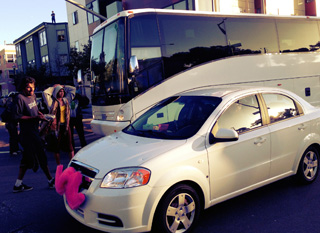
The San Francisco Chronicle ran a story Monday about disabled passengers' access to vehicles doing business through companies like UberX and Lyft. The Chron reported that the San Francisco Municipal Transportation Agency is worried about disability access because a quarter of wheelchair-accessible cabs are currently off the streets due to a lack of drivers. One reason for that: So many taxi drivers have switched to driving for the ride-service firms.
In its decision last year officially sanctioning these transportation network companies (or TNCs) to operate in California, the CPUC said it wants "to ensure that there is no divide between service provided to the able and disabled communities." To that end, the commission is requiring that the companies allow passengers to indicate whether they need a wheelchair-accessible vehicle, and that TNCs like Lyft and UberX submit a yearly report stating how often the company was able to comply with the request. The first such report is due in September.
The CPUC also requires that TNCs submit a "plan for how the TNC will work to provide appropriate vehicles for passengers who specify access needs, including but not limited to a plan to provide incentive to individuals with accessible vehicles to become TNC drivers."
The Chronicle looked at the access plans filed by Lyft, UberX, Sidecar, Tickengo (Wingz) and Instant Cab. Those last two proposed the most specific steps to meet the wheelchair requirement: InstantCab said it was considering offering higher pay to drivers with accessible vehicles, and Tickengo said it would cut its commission for such drivers.
Below are documents filed by Lyft and UberX (filing as Rasier) in November. As you can see they are short on specifics as to how the companies will comply with the CPUC's mandate on wheelchair access. Marilyn Golden, senior policy analyst with the Disability Rights Education and Defense Fund, told KQED that "these ride-sharing apps are not taking seriously their responsibilities under federal law and local regulation to provide full services for people with disabilities. ... It appears that they will not attempt the more difficult measures, such as establishing a fleet of wheelchair-accessible vehicles."